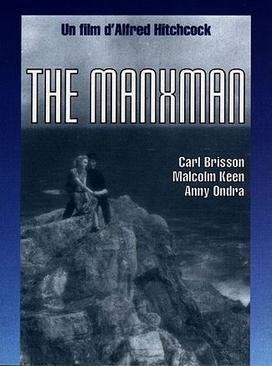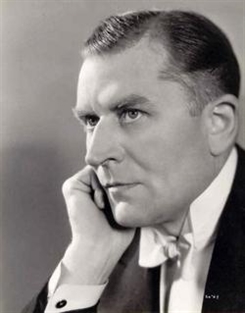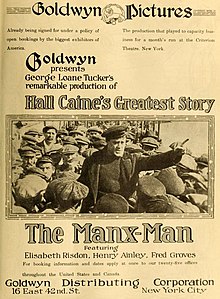
Sir Thomas Henry Hall Caine, usually known as Hall Caine, was a British novelist, dramatist, short story writer, poet and critic of the late nineteenth and early twentieth century. Caine's popularity during his lifetime was unprecedented. He wrote fifteen novels on subjects of adultery, divorce, domestic violence, illegitimacy, infanticide, religious bigotry and women's rights, became an international literary celebrity, and sold a total of ten million books. Caine was the most highly paid novelist of his day. The Eternal City is the first novel to have sold over a million copies worldwide. In addition to his books, Caine is the author of more than a dozen plays and was one of the most commercially successful dramatists of his time; many were West End and Broadway productions. Caine adapted seven of his novels for the stage. He collaborated with leading actors and managers, including Wilson Barrett, Viola Allen, Herbert Beerbohm Tree, Louis Napoleon Parker, Mrs Patrick Campbell, George Alexander, and Arthur Collins. Most of Caine's novels were adapted into silent black and white films. A. E. Coleby's 1923 18,454 feet, nineteen-reel film The Prodigal Son became the longest commercially made British film. Alfred Hitchcock's 1929 film The Manxman, is Hitchcock's last silent film.

The Manxman is a 1929 British silent romance film directed by Alfred Hitchcock and starring Anny Ondra, Carl Brisson and Malcolm Keen. The film is based on a popular 1894 romantic novel The Manxman by Hall Caine, which had previously been made into a film 13 years earlier. It was the last fully silent production that Hitchcock directed before he made the transition to sound film with his next film Blackmail (1929).

Malcolm Keen was an English actor of stage, film and television. He was sometimes credited as Malcolm Keane.

Elisabeth Risdon was an English film actress. She appeared in more than 140 films between 1913 and 1952. A beauty in her youth, she usually played in society parts. In later years in films she switched to playing character parts.

George Loane Tucker was an American actor, silent film director, screenwriter, producer, and editor.

The Manxman is a novel by Hall Caine, first appearing as a serial in The Queen, The Lady's Newspaper and Court Chronicle between January and July 1894. Published as one volume in August 1894 by Heinemann, The Manxman ended the system of three-volume novels. A highly popular novel of its period, it was set in the Isle of Man and concerned a romantic triangle. The novel has as its central themes, the mounting consequences of sin and the saving grace of simple human goodness.
Smith is a 1917 British silent romance film directed by Maurice Elvey and starring Elisabeth Risdon, Fred Groves and Manora Thew. It was based on the 1909 play Smith by Somerset Maugham.

The Bondman is an 1890 best-selling novel by Hall Caine set in the Isle of Man and Iceland. It was the first novel to be released by the newly established Heinemann publishing company. It was a phenomenal success and was later adapted into a successful play and two silent films.
The Loss of the Birkenhead is a 1914 British silent historical drama film directed by Maurice Elvey and starring Elisabeth Risdon, Fred Groves and A. V. Bramble. The film is set against the backdrop of the sinking of the troopship HMS Birkenhead in 1852.
Meg the Lady is a 1916 British silent crime film directed by Maurice Elvey and starring Elisabeth Risdon, Fred Groves and Eric Stuart. The film is based on the 1905 novel of the same name by Tom Gallon.
Mother Love is a 1916 British silent drama film directed by Maurice Elvey and starring Elisabeth Risdon, Fred Groves and Frank Stanmore.
Charity Ann is a 1915 British silent drama film directed by Maurice Elvey and starring Elisabeth Risdon, Fred Groves and Chappell Dossett.
A Will of Her Own is a 1915 British silent drama film directed by Maurice Elvey and starring Elisabeth Risdon, Fred Groves and Hilda Sims.
Esther is a 1916 British silent historical film directed by Maurice Elvey and starring Elisabeth Risdon, Fred Groves and Charles Rock. The film portrays the biblical story of Esther.
Gilbert Gets Tiger-Itis is a 1915 British silent short comedy film directed by Maurice Elvey and starring Fred Groves and Elisabeth Risdon.
Home is a 1915 British silent drama film directed by Maurice Elvey and starring Elisabeth Risdon, Fred Groves and A. V. Bramble. A poor girl discovers she is really a Duke's daughter, but eventually returns to her own family of fishermen.
Driven is a 1916 British silent drama film directed by Maurice Elvey and starring Elisabeth Risdon, Fred Groves and Guy Newall. The film is based on the play The Evolution of Katherine by E. Temple Thurston. After learning she hasn't long to live, a woman begins an affair.
The Idol of Paris is a 1914 British silent drama film directed by Maurice Elvey and starring Elisabeth Risdon, Fred Groves and A. V. Bramble. The film was based on a play of the same title by Charles Darrell.
The Christian is a 1915 British silent film directed by George Loane Tucker and starring Derwent Hall Caine and Elizabeth Risdon. The film is an adaptation of Hall Caine's 1897 novel The Christian. This was the third film of the story, the first The Christian (1911) was made in Australia and the second The Christian (1914) was made in the United States. The Christian was made by the London Film company, which was at the time England's most highly regarded producing organisation and whose policy was to film works of the great authors.







